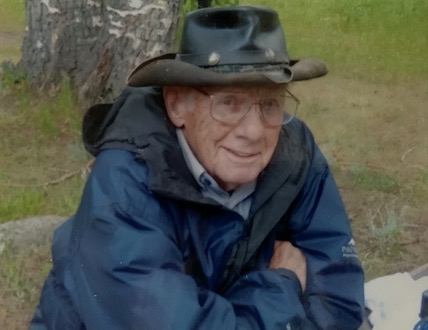
Clyde Ray Burnett, Ph.D., a longstanding faculty member in the Department of Physics at Florida Atlantic University, died peacefully in his mountain home near Rollinsville, Colorado on May 27, 2020, after a short illness. Clyde was a former chair for the Department of Physics, a professor, and served as professor emeritus during his time at the University.
Luc Wille, Ph.D, chair and professor for the Department of Physics, shares, "Clyde was a highly respected atmospheric physicist and one of the founders of the physics department at FAU, serving as department chair in the late 1960's. After he moved to Colorado he stayed in close contact with the department, frequently visiting and giving guest lectures. He was an engaging speaker full of enthusiasm for the subject. His observational studies of the composition of the upper atmosphere are considered classics and continue to be highly relevant to current issues in climate science. He was a kind, generous man whose legacy will live on."
Clyde was born on December 23, 1923 in Rudd, Iowa and was raised on a farm near Nora Springs, Iowa. He attended Rudd High School and then enrolled in the University of Upper Iowa. He interrupted his academic work in order to join the World War II effort. He entered the meteorology training program at the University of Chicago and the University of Wisconsin, Madison. After completing his training, he became a commissioned officer with the 8th weather squadron of the Army Air Corps and flew 41 missions (1700 hours) across the North Atlantic as the meteorologist and weather reconnaissance officer on board.
Following the war, he returned to the University of Upper Iowa on the GI bill and graduated with a B.S. in mathematics and a minor in chemistry. He received his master’s degree (1948) and his Ph.D. (1951) in Physics at the University of Wisconsin. He was a well-known professor and research scientist at South Dakota State College (1950-1953), Pennsylvania State University (1953-1963), Princeton University (1957-1958 on leave from Penn State), and Florida Atlantic University (1964 until retirement). At Princeton, he participated in the early work on fusion, the central results of which are still manifest in the current fusion work. Clyde conducted the world’s longest continuous research on OH (hydroxyl) in the atmosphere (33 years), using an optical measurement with his specially designed Pepsios spectroscope. Most of his research was funded by the National Science Foundation. He conducted his research at different latitudes including in Boca Raton, Florida; NOAA’s Fritz Peak Observatory, Rollinsville, Colorado; Alaska; Truk Island, Micronesia; and Lauder, New Zealand.
He was a father to five children, grandfather to nine grandchildren, and great grandfather to eight great grandchildren. In the summers, he enjoyed camping and canoeing with his family and their collie dogs. He also took long canoe trips with friends. He liked hiking along the Appalachian Trail, in the Adirondacks, and in the mountains of Colorado, including Rocky Mountain National Park and Rollins Pass. He also enjoyed time in Everglades National Park, Corkscrew Sanctuary, and Everglades City in Florida. He was an avid birdwatcher and especially enjoyed the flocks of rosy finches that congregated on his mountain deck in winter. He was a tireless advocate for wildfire mitigation. In his later years, he volunteered at Golden Gate Canyon State Park in Colorado and at Loxahatchee National Wildlife Refuge in South Florida.
In addition to many peer-reviewed research papers, he began writing fiction and non-fiction books during the last decades of his life—totaling seven—under the pen name of Alex Cook. He held a deep concern for the environment, with a special focus on educating the general public about the extreme threat of climate change. He wrote a monthly column, “Climate Conversations” for the Mountain Ear community newspaper in Nederland, Colorado and made keynote presentations to organizations in Colorado and Florida on climate change.
He is survived by four of his five children: Beverly O’Reilly (Mike) of Fernandina Beach, Florida; Pamela Van Scotter (Bruce Hurd) of Colorado Springs, Colorado; Janet Summers (Rick) of Deerfield Beach, Florida; and Craig Burnett (Alison) of Boca Raton, Florida; and all of his grandchildren and great grandchildren. He is also survived by his long-time companion, Leslee Schmitt of Black Hawk, Colorado. His daughter Marcia Montague preceded him in death as did his parents Neil Burnett and Grace Ella Aiken Burnett and his sister Gladys Burnett Daniels.
Contributions in his memory may be made to 350.org, The Union of Concerned Scientists, or the Audubon Society.
Read more in remembrance for Clyde: The Mountain Ear published "In Loving Memory Of Clyde Burnett." And the NOAA Chemical Sciences Laboratory published, "Remembering Clyde Burnett."